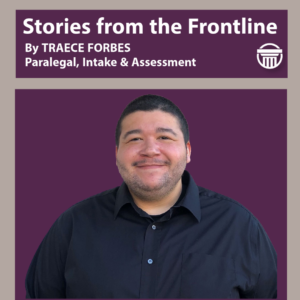
The legal advice we give to our clients through the Intake and Assessment Hotline is often all they need to start a process on their own. Sometimes, along the way, they may still run into general questions or have concerns and that’s why the hotline can be so important for them. Even if they don’t get representation through our office, they can always call us back with their questions. The following story is one example of how we were able to assist a self-represented litigant, recently diagnosed as bipolar, with a critical family law issue.
Antonio (fictitious name) called us seeking assistance with obtaining custody orders over his two minor children. His wife Andrea (fictitious name) took their children and left him shortly after he was diagnosed with bipolar disorder. She felt his mental health condition was going to put them in an unsafe living environment and in harm’s way, even though he had never done anything to warrant her concern.
After Andrea left, Antonio would periodically check in to see if he could spend some time with their children. Each time she refused and stayed adamant against any contact. As I spoke with Antonio I learned how very concerned he was about losing his children because of the bipolar diagnosis and how Andrea reacted to it. At that point, he said he felt as if he had already lost.
He’d gone through the family law court system a few times through prior relationships but always had difficulty navigating it. However, because of his experience, he felt confident about being able to explain his case to a judge. His largest hurdle was figuring out how to start a custody case and that is what led him to contact us.
As part of the advice we gave him through the Intake and Assessment hotline, he was not only given detailed steps on what documents he needed to complete to start a custody case, but he was also given talking points he could focus on when explaining how, although he may have been diagnosed with being bipolar, it would not affect his ability to properly care for his children.
After I read the advice to Antonio, he was grateful to finally learn what he needed to complete to request custody and how he should present it, but more importantly he felt far more motivated to take on the case in front of him, knowing he could turn to us if he had further questions.



